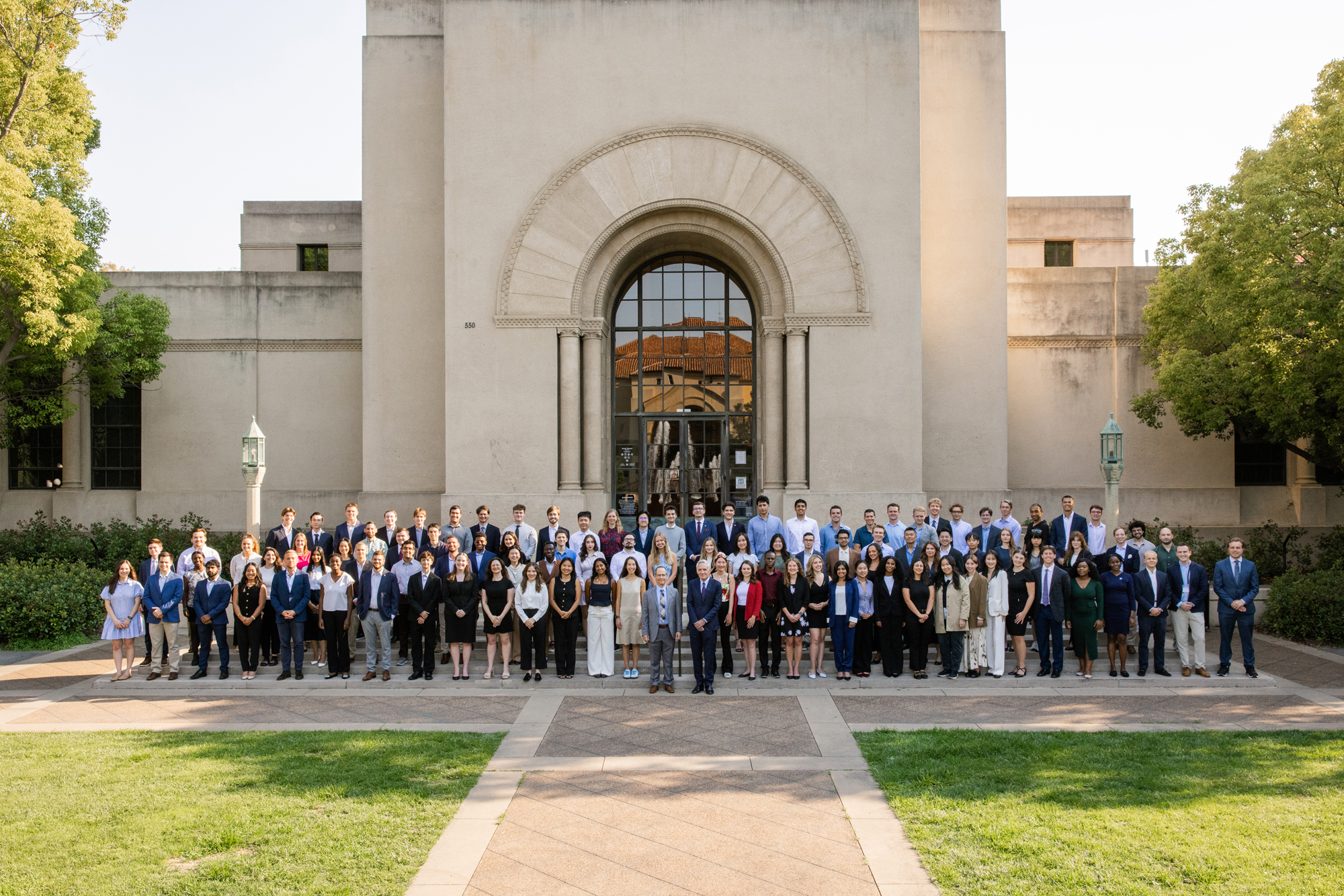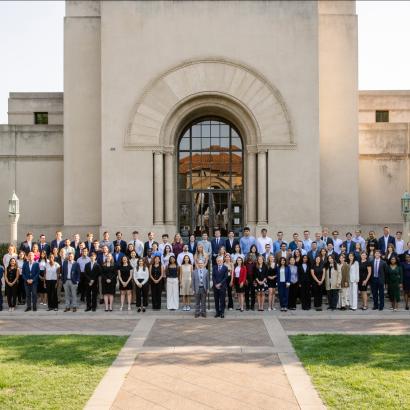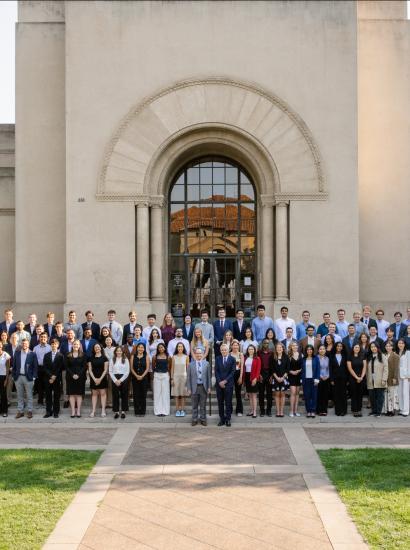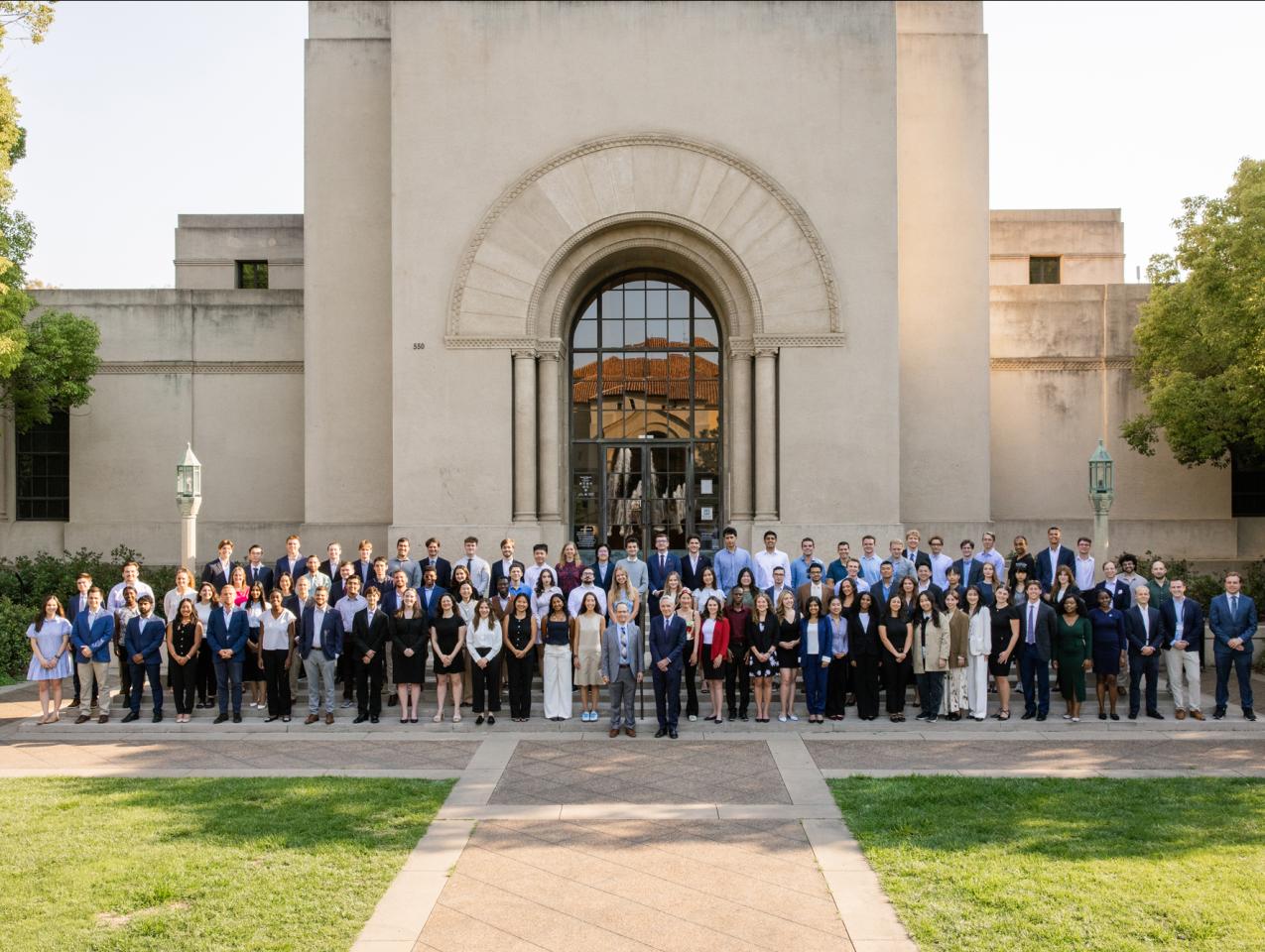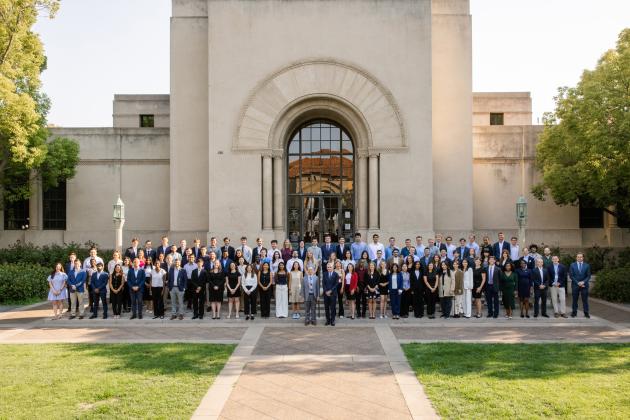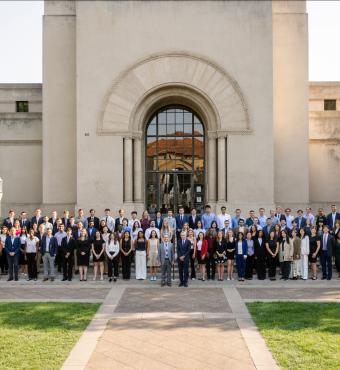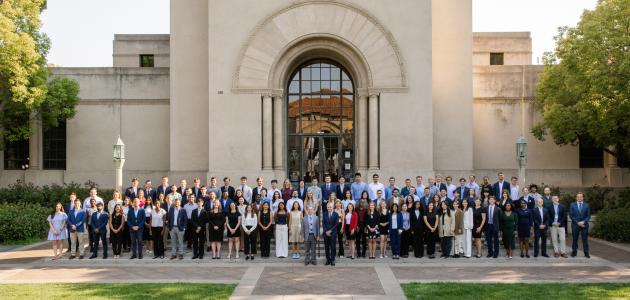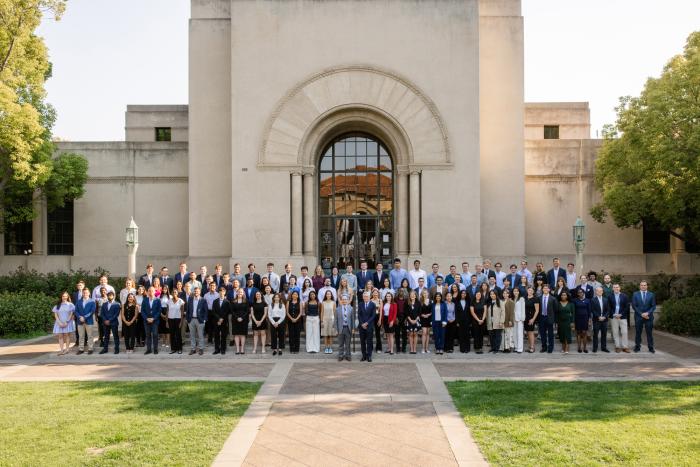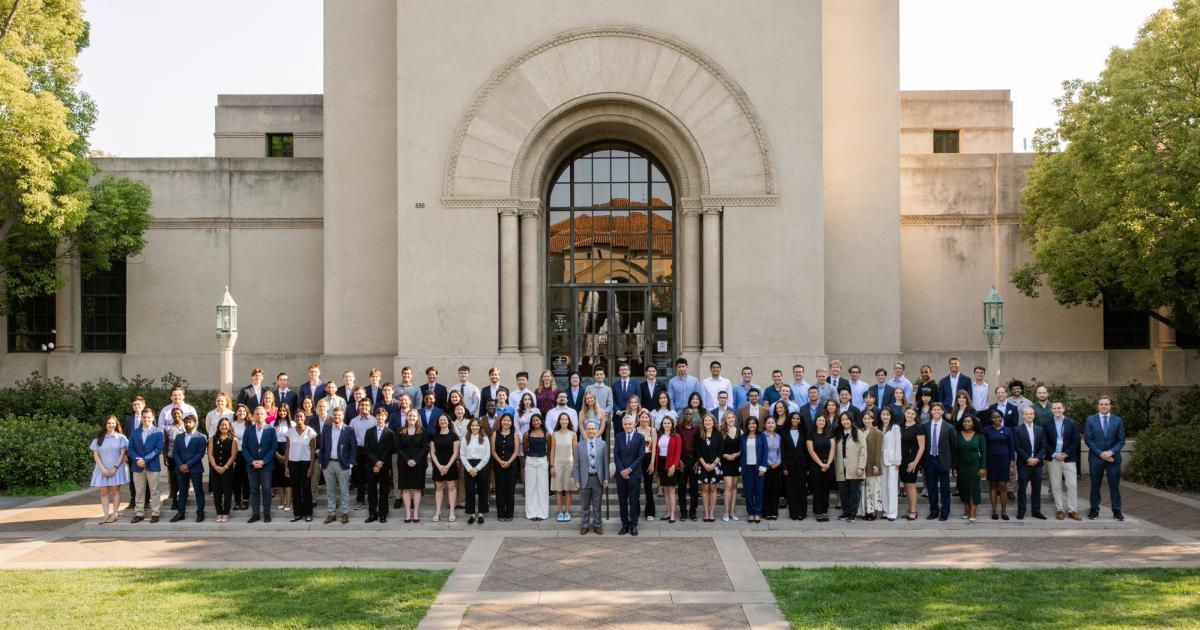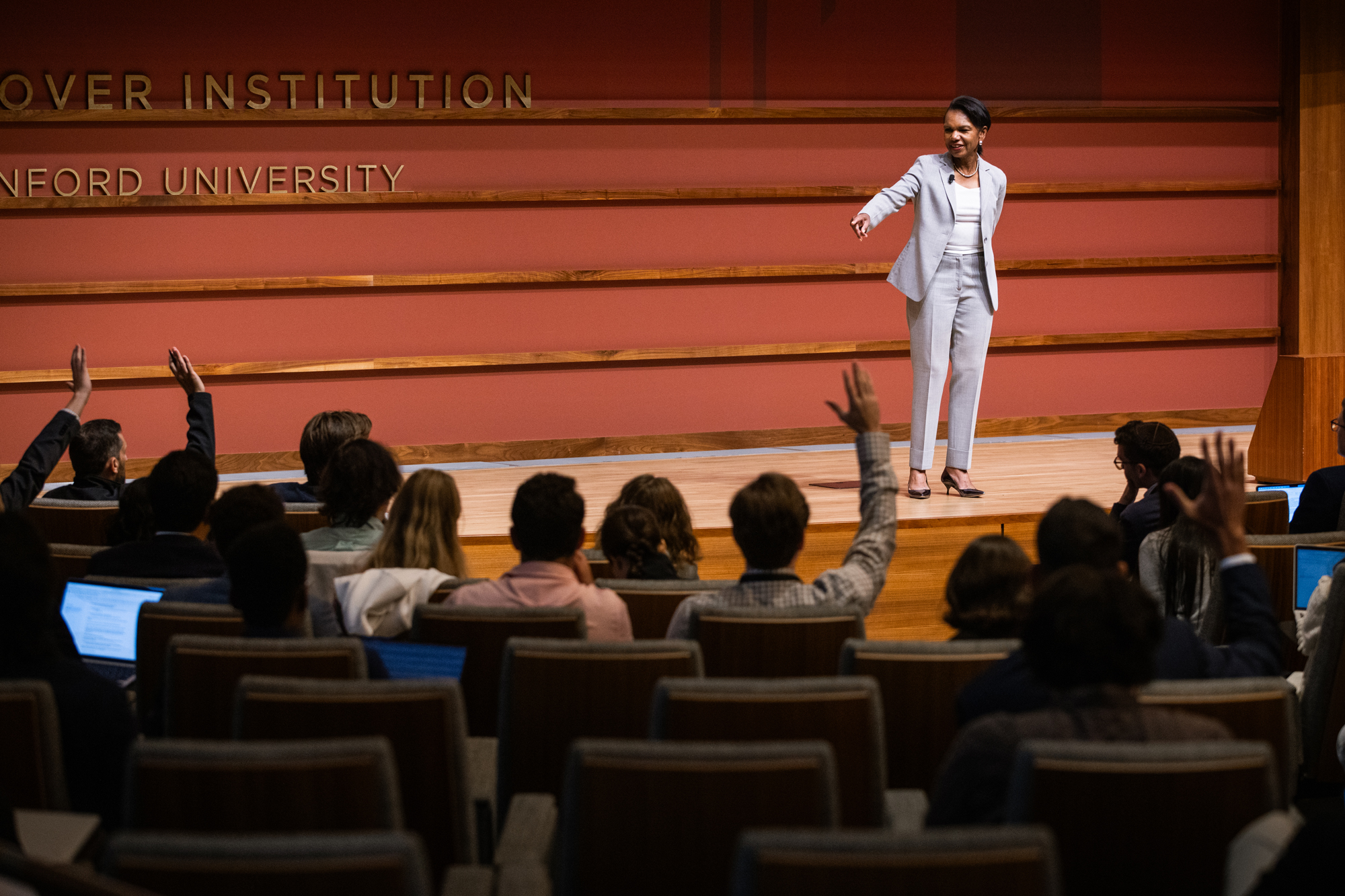
Hoover Institution (Stanford, CA)—Students and recent graduates from around the world gathered for the ninth annual Hoover Institution Summer Policy Boot Camp (HISPBC) from August 10 to 14, 2025.
Participants had the unique opportunity to hear from a wide cross section of the Hoover fellowship, speaking about topics including monetary and fiscal policy, environmental sustainability, the emerging Trump foreign policy doctrine, and who is positively and negatively impacted by regulations such as the minimum wage.
“The meaningful point of this experience, the true goal, is to teach students to think critically about public policy and its results,” said co-director and Senior Fellow Scott W. Atlas. “We told the students we are here to challenge them, to make them think and consider the facts rather than just gut feelings when forming their opinions—and, especially, not to protect them from ideas they may not like.”
The Hoover Institution Summer Policy Boot Camp is made possible by the generosity of the Kurt Hauser family.
Student participants are invited to complete a policy proposal essay that argues for a specific solution to a policy problem, due after the completion of boot camp.
Leading entries are honored with the Director’s Award, which comes with a $500 cash prize and an invitation to an upcoming Hoover Institution Board of Overseers meeting.
Subjects tackled by some past winners can be found here.
Read more about the program here. Applications to attend the 2026 Boot Camp open in November 2025.
Condoleezza Rice on the Emerging Global Order

In her talk with HISPBC attendees, Hoover Institution Director Condoleezza Rice charted the origins of the liberal international order, from the end of the Second World War to the establishment of NATO and an economic commons based on free trade. All of that is now under threat, and she says what will rise to replace it is still unclear. But she acknowledged some of the domestic discontent with this global order emerged because of divisions between elites and ordinary people within America, and that understanding what fuels those divisions can better illuminate what path the nation will take. But as this transition emerges, Rice stressed that America is way too powerful a nation to just serve as a source of uncertainty for the rest of the world.
Stephen Kotkin on the Challenge of America’s Global Success
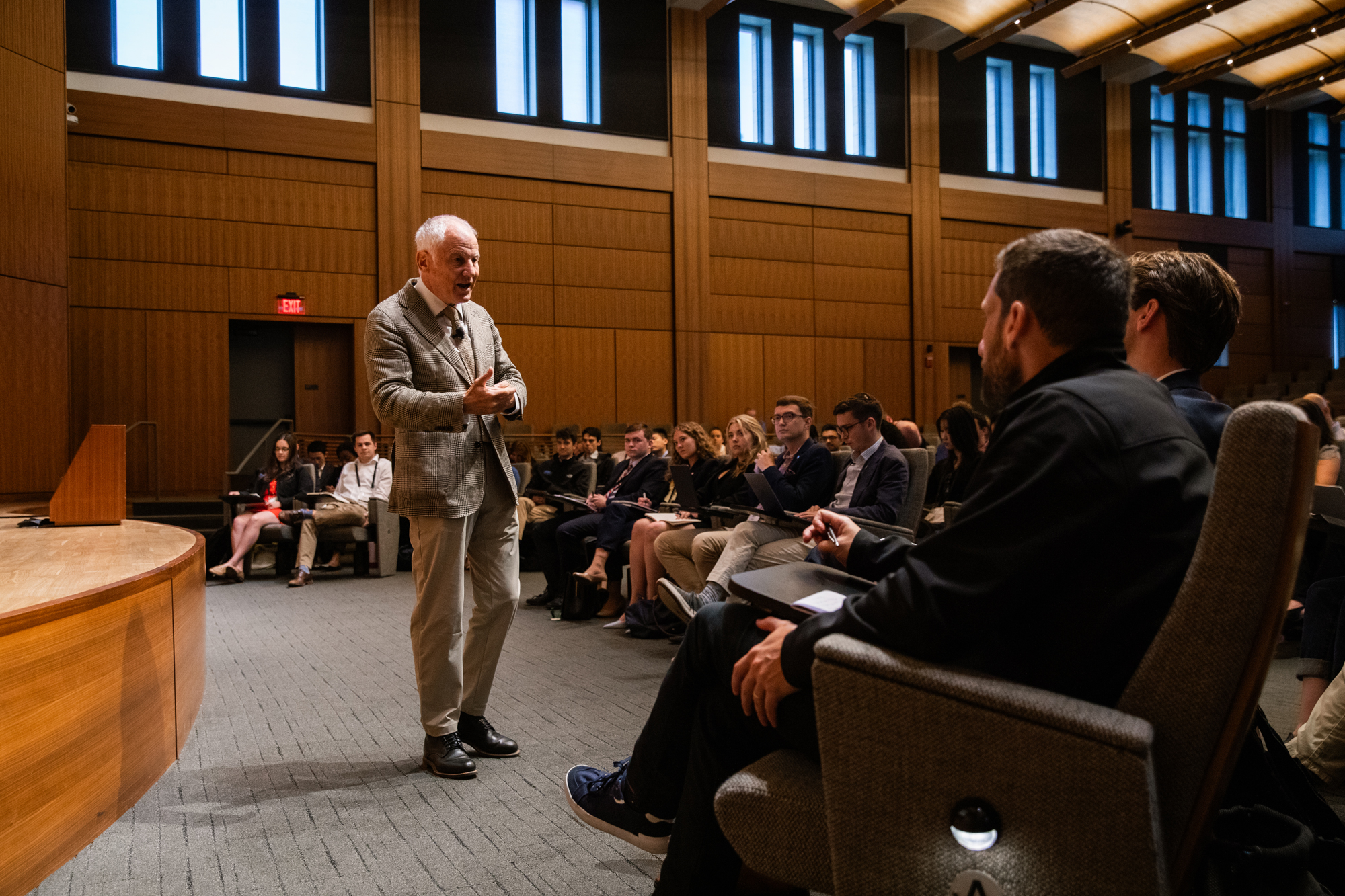
In his discussion, Senior Fellow Stephen Kotkin asked attendees to imagine they had fallen under a multi-generational slumber in 1975 and woken up only today. He pointed out that while technology has advanced considerably in that time, and America’s combined national power has grown immensely too, the United States and its allies are still confronting an authoritarian, Eurasian power that is upset at the scale of America’s success; the only difference is that the main adversary is now China, not Russia as it was 50 years prior. As it was then, America’s enemies resent its success, Kotkin says, and seek to tear down the structures America created because of that resentment.
Josh Rauh on the Role of Government in the Economy
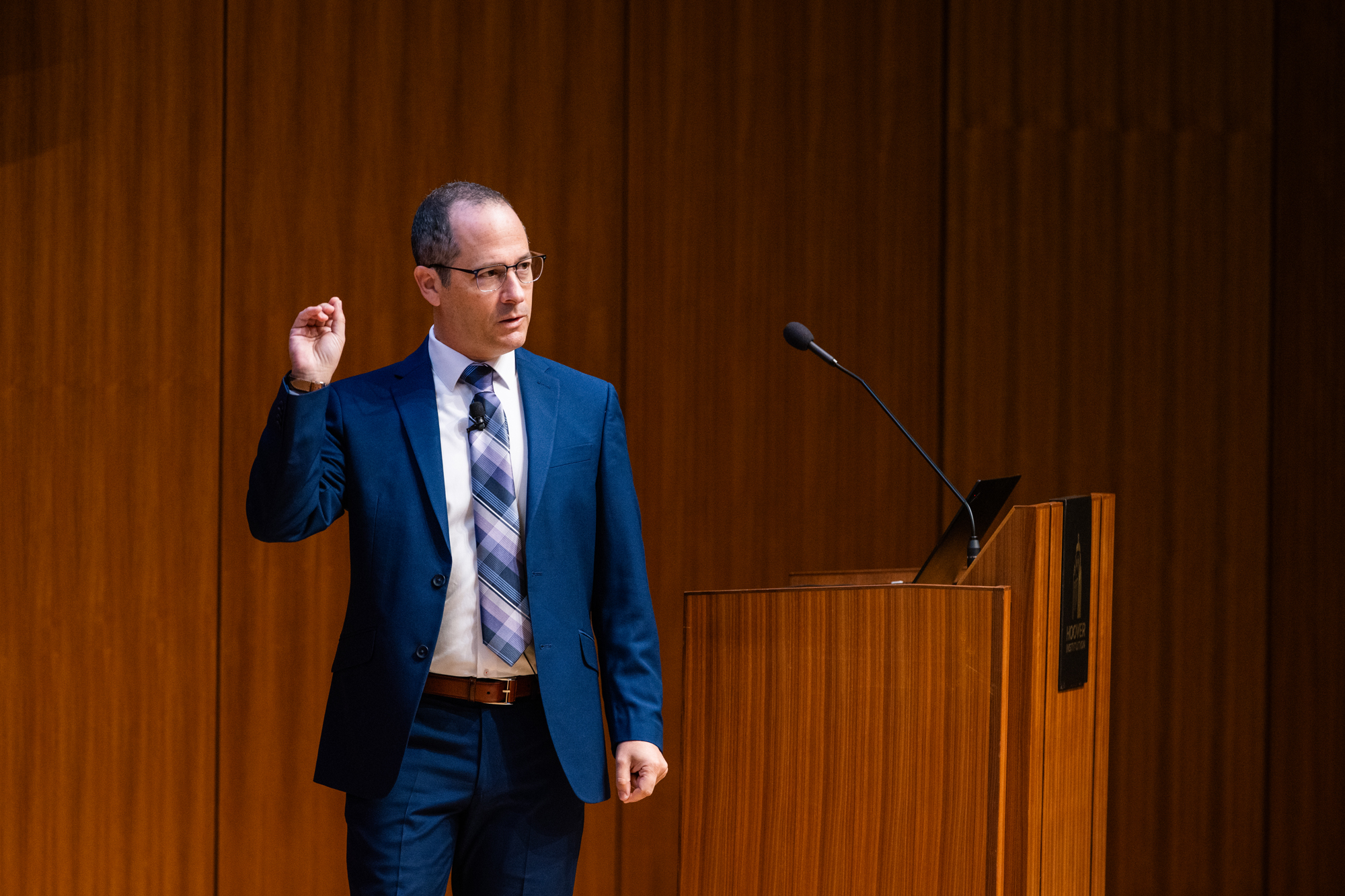
In this opening talk on August 11, HISPBC codirector Joshua D. Rauh spoke to attendees about the proper way to think about the role of government spending in shaping the economy. Through live instant polling of the boot camp participants, he contrasted their perceptions about the government’s role in the economy with the reality. The government engages in much more expansive intervention, taxation, and redistribution than most people think, leading to significant economic costs.
John Cochrane on Inflation
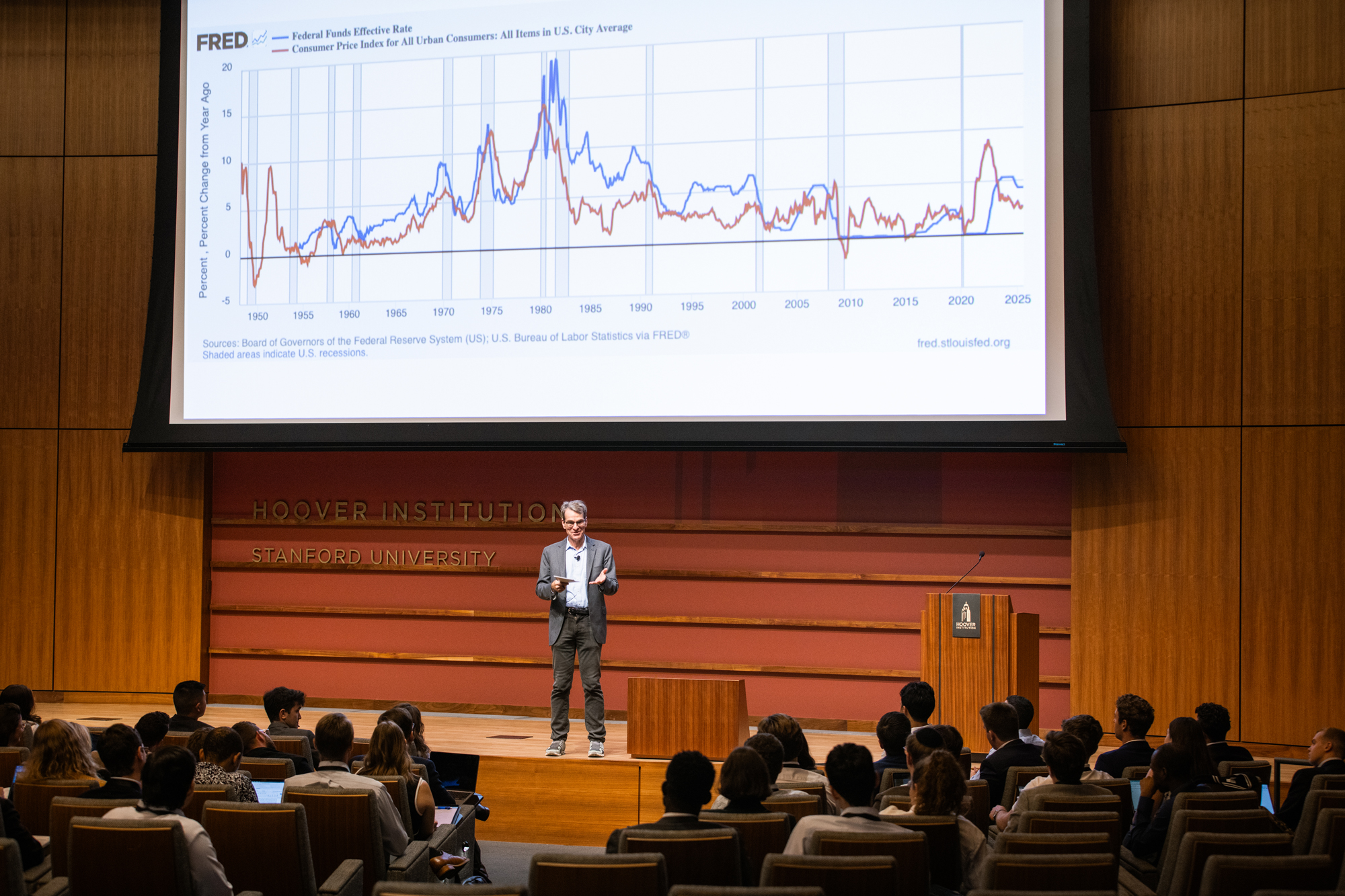
Senior Fellow John H. Cochrane spoke about the US Federal Reserve System’s slow response to rising inflation in 2022 as well the possibility of its return in 2025, something that continues to impact ordinary US households. He spoke about his fiscal theory of the price level and how government borrowing and inflation may be linked.
He argues that when markets believe fiscal deficits will continue endlessly, this causes inflation, in part due to declining faith in the ability for repayment and the expectation that the sustained borrowing will someday increase the money supply. He took this belief and applied it to emergency federal spending during the COVID-19 pandemic, where the federal government added $5 billion to the national debt, $3 billion of this simply by increasing the money supply.
Gen. Jim Mattis on National Unity
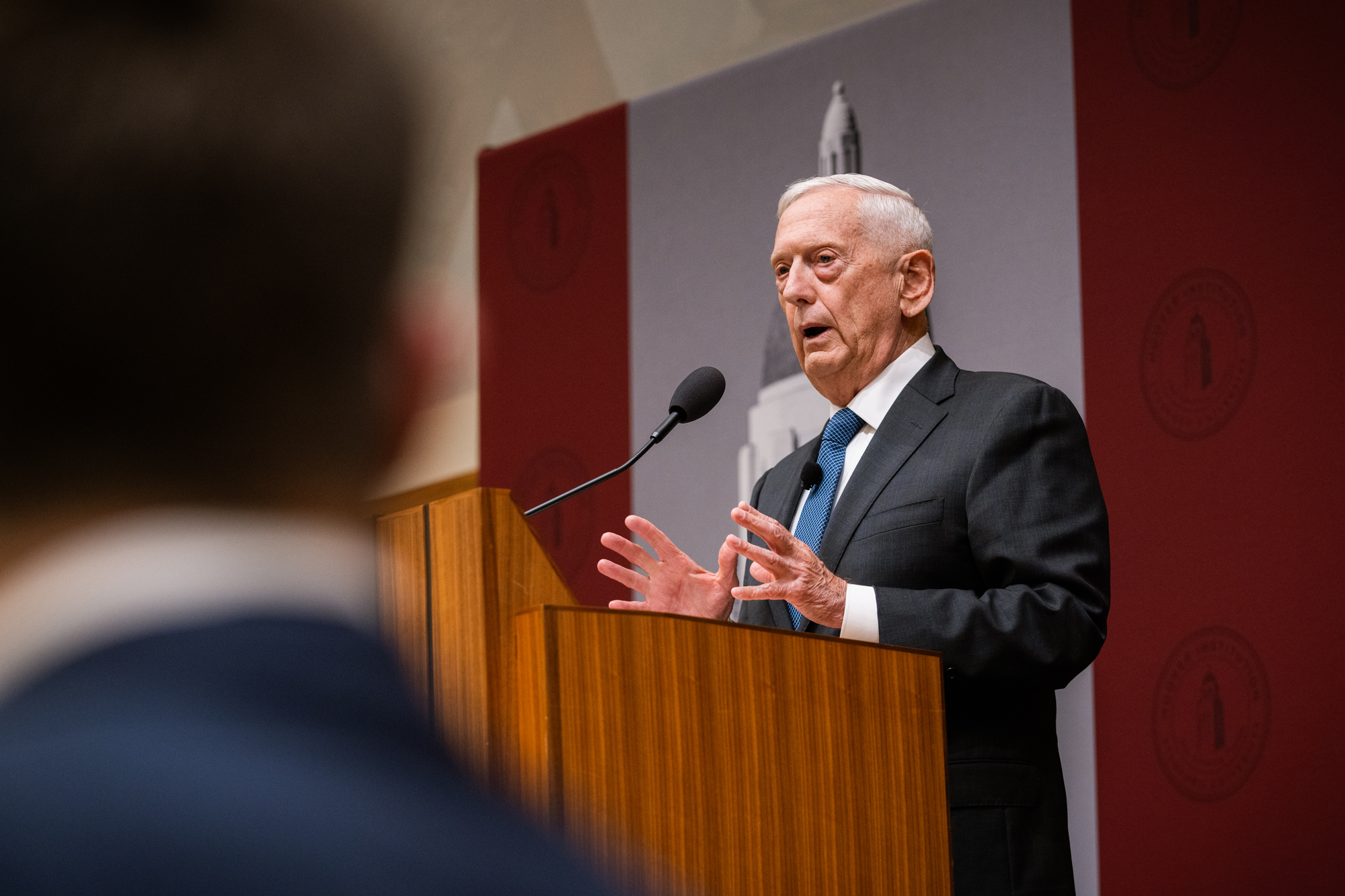
Addressing students over dinner, Distinguished Fellow General Jim Mattis spoke of the need for a return to unity in the United States. He overlaid that call with an expression of concern for the state of America’s major alliances in its own hemisphere, in Asia, and in Europe.
Steven Koonin on the Factual Context for Climate and Energy
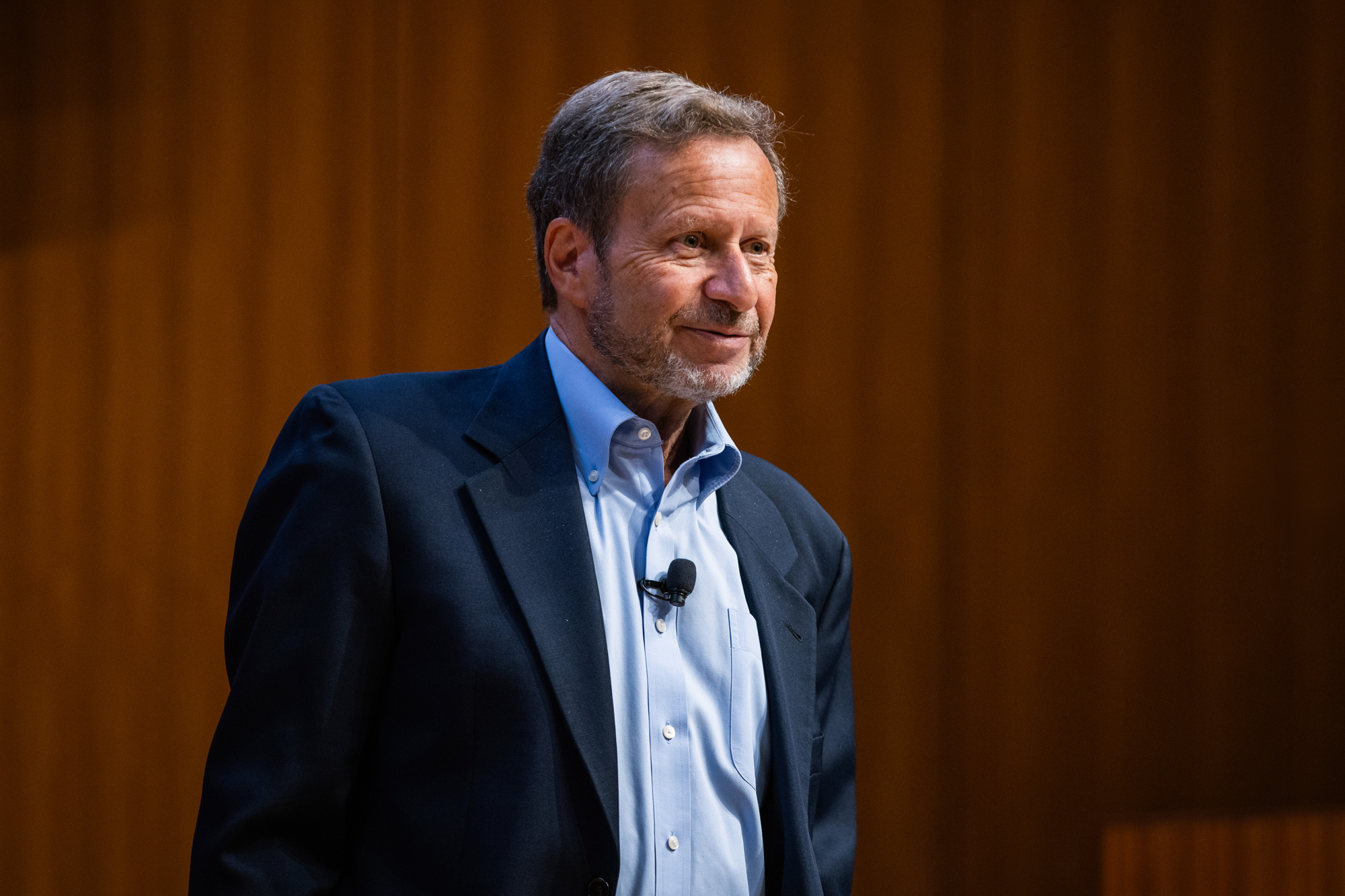
In his presentation, Edward Teller Fellow Steven Koonin spoke about the idea that while carbon dioxide emissions are having an impact on global temperatures rising, the connection between those rising temperatures generating an increase in extreme weather events is tenuous, even in the annals of the latest UN Intergovernmental Panel on Climate Change report. He also spoke about the enormous and often unmentioned challenges associated with transitioning the entire world’s economy to using renewable sources of electricity.
H.R. McMaster on Threats to American Security
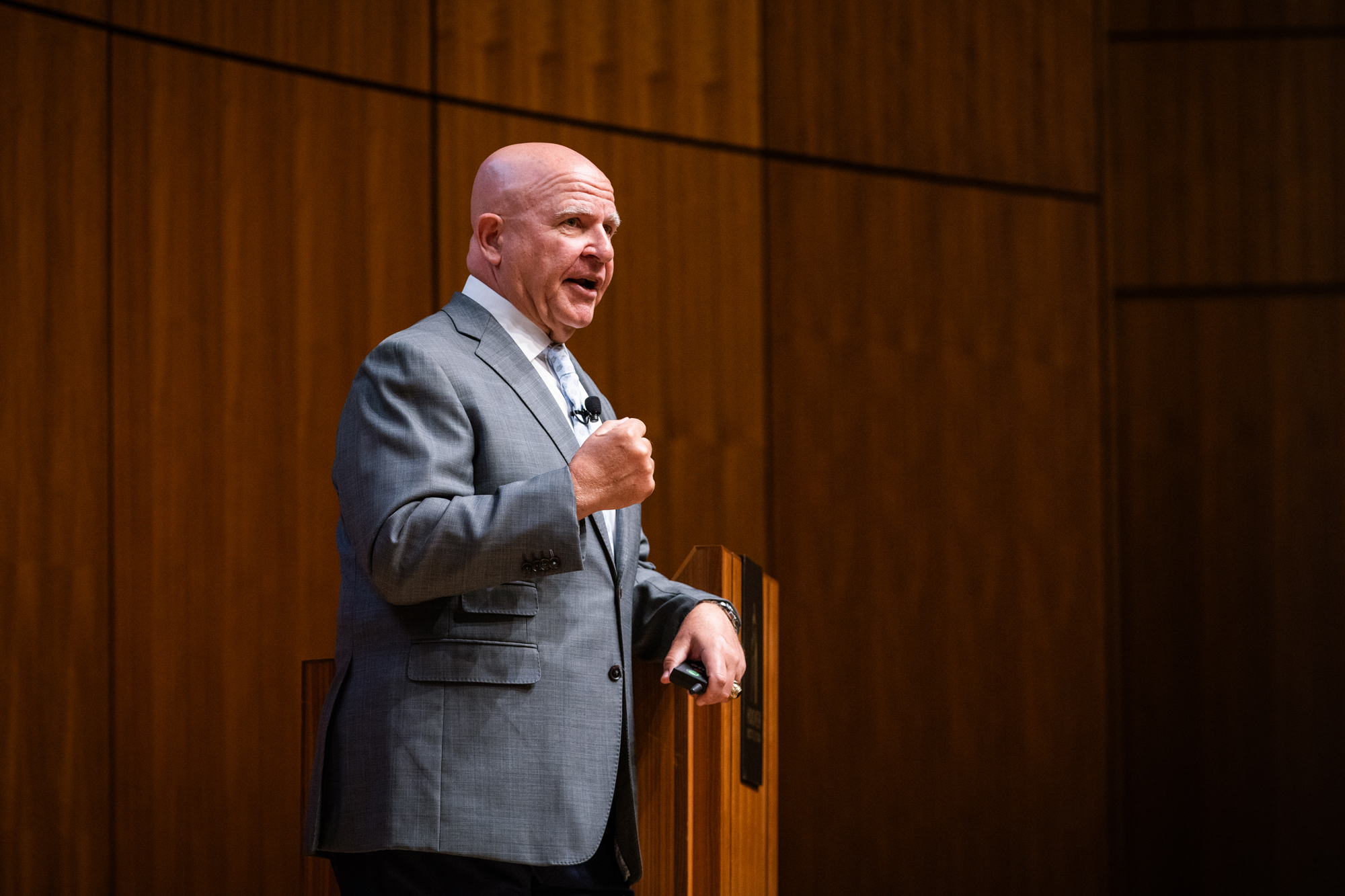
In his talk, Senior Fellow H.R. McMaster spoke about the global “axis of aggressors” coalescing around shared anti-American sentiment, with Russia, China, North Korea, and Iran the main participants, alongside smaller American irritants like Cuba and Venezuela. He said that this axis continues to threaten American interests as well as the interests of our allies. He spoke of the approach necessary to counter those threats, and he also commented on recent actions by the US to assist Israel and Ukraine and countering China.
Victor Davis Hanson on The End of Citizenship
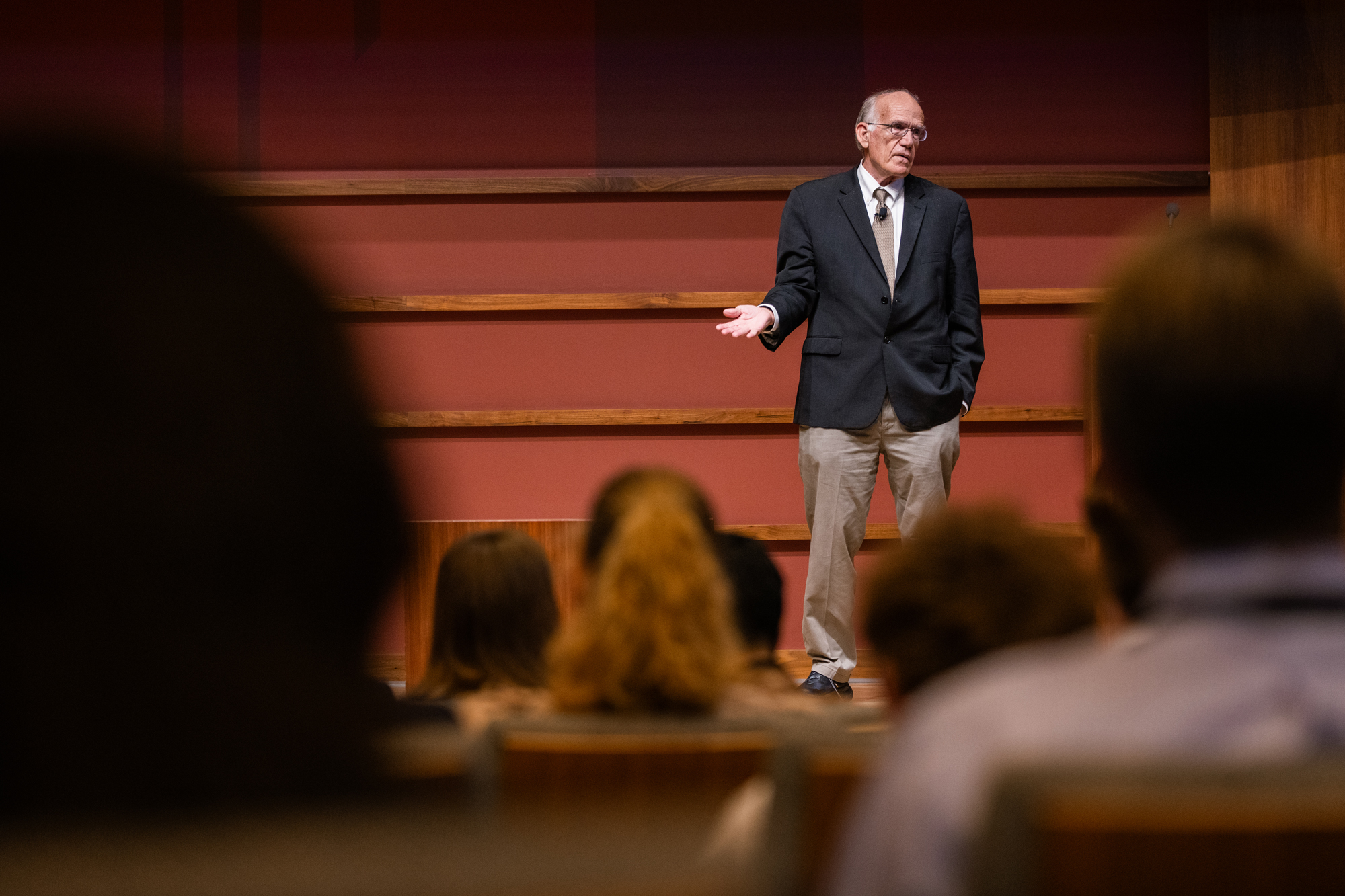
In his talk, Senior Fellow Victor Davis Hanson emphasized the value of citizenship and how relatively young it is as a concept in the context of all of human history. But many of the attributes typically associated with citizenship are under strain. Some school districts allow non-citizens to vote in school board elections, and non-citizens are allowed to enlist in the US military. Davis Hanson says the prevalence of legal and illegal residents who are not citizens in the US today threatens our continued success as a multiracial constitutional democracy.
Dominic Parker on Science vs. Advocacy in Academic Research
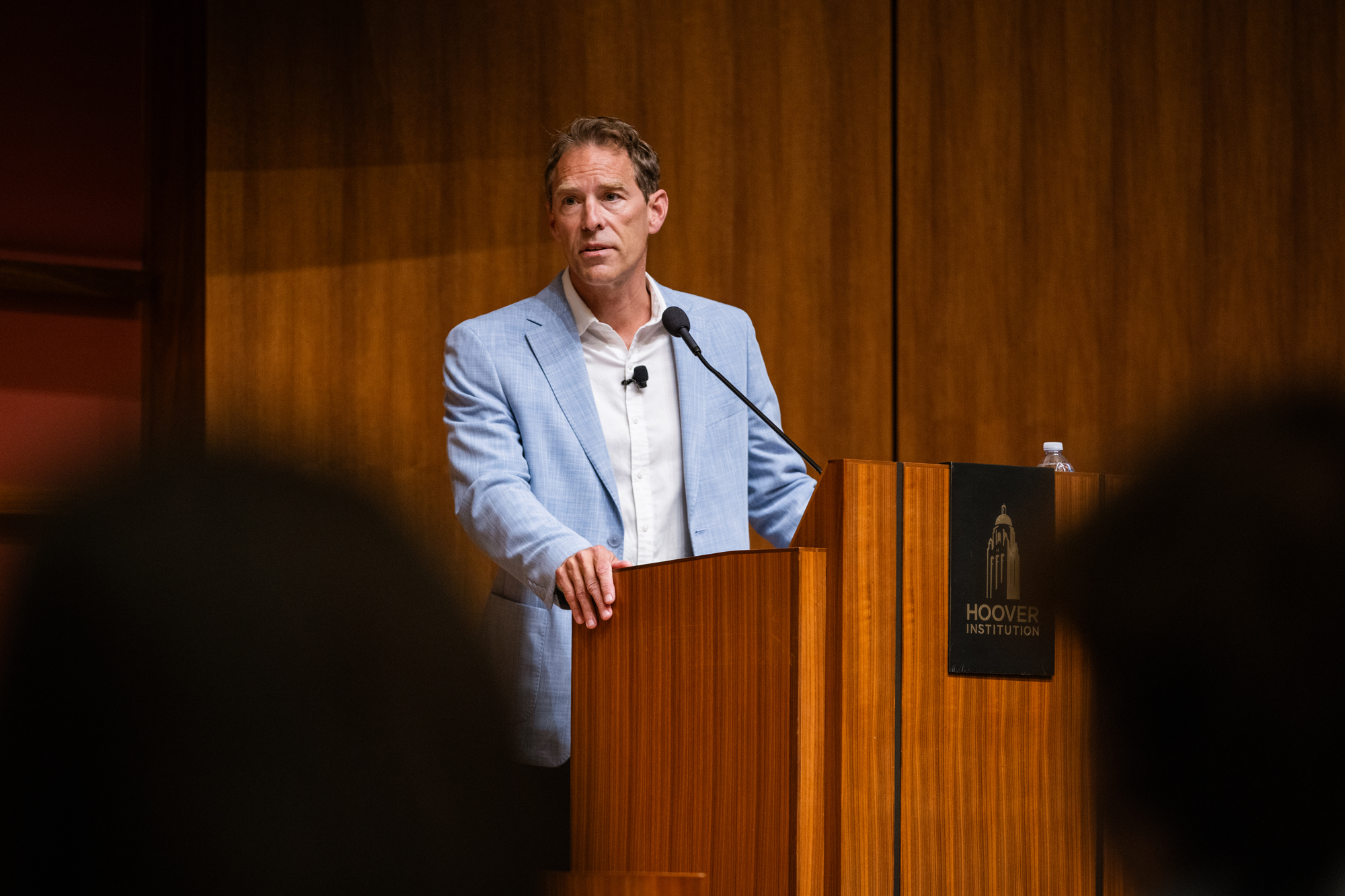
Senior Fellow Dominic Parker spoke of his research into the subjective language of environmental advocacy that is percolating into modern academic literature. After running the abstracts of 180 thousand journal articles into a system detecting non-objective language, he found the average use of subjective language in environmental economics and environmental science papers increased considerable between 1990 and 2023.
Frank Dikötter on The History of Chinese Communism
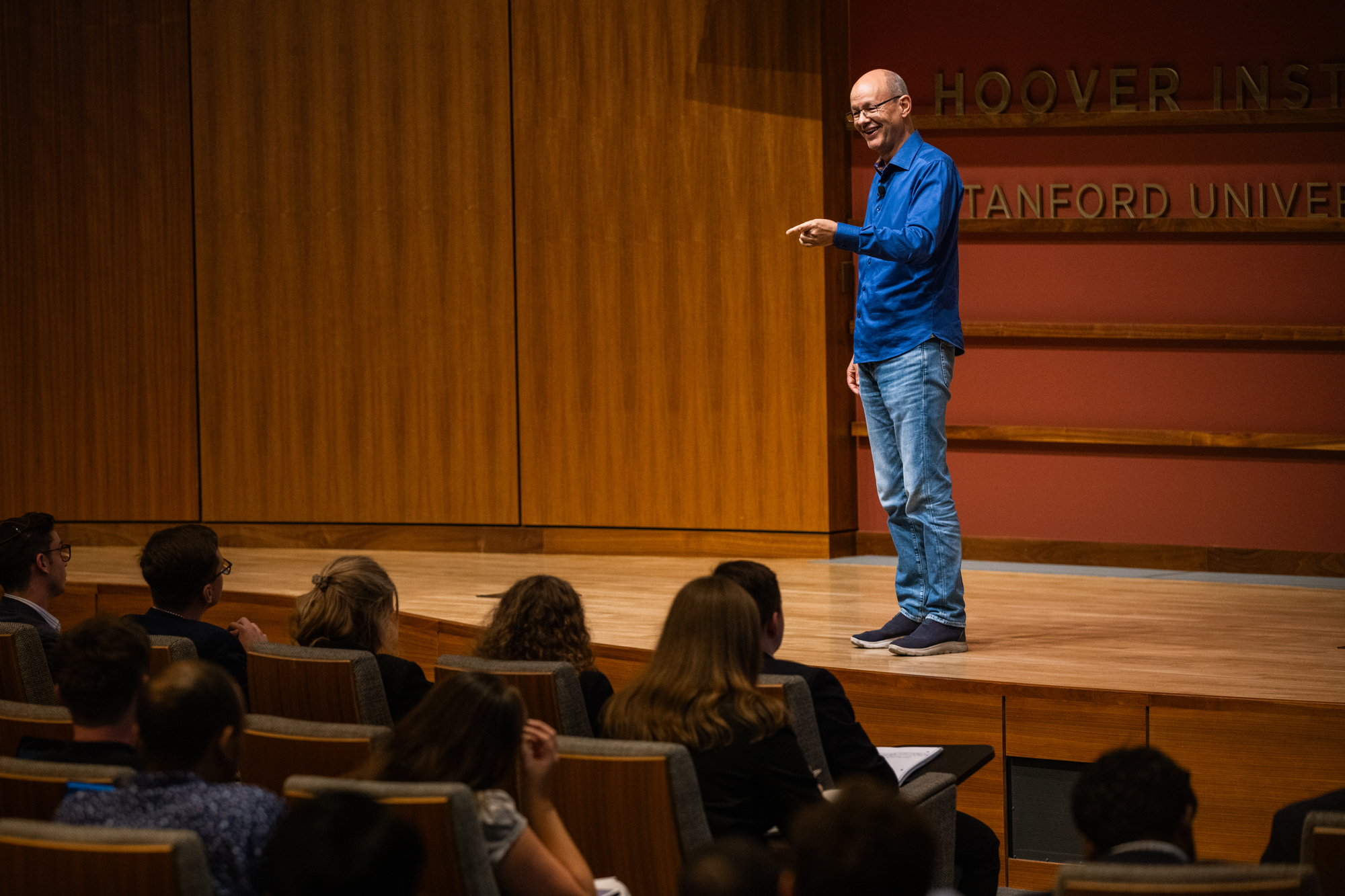
Senior Fellow Frank Dikötter spoke to HISPBC attendees about how scrutinizing the history of communist rule in China can illuminate lessons key to understand that country’s present. He spoke of the enduring communist characteristics of China’s system, including the dominance of state-run banks in its financial sector. He pointed out that many observers considering China fail to properly consider the control it exerts over its population, with an ability to move and raze entire towns and villages if doing so serves the goals of the state.
Stephen Haber—Innovation and American Prosperity
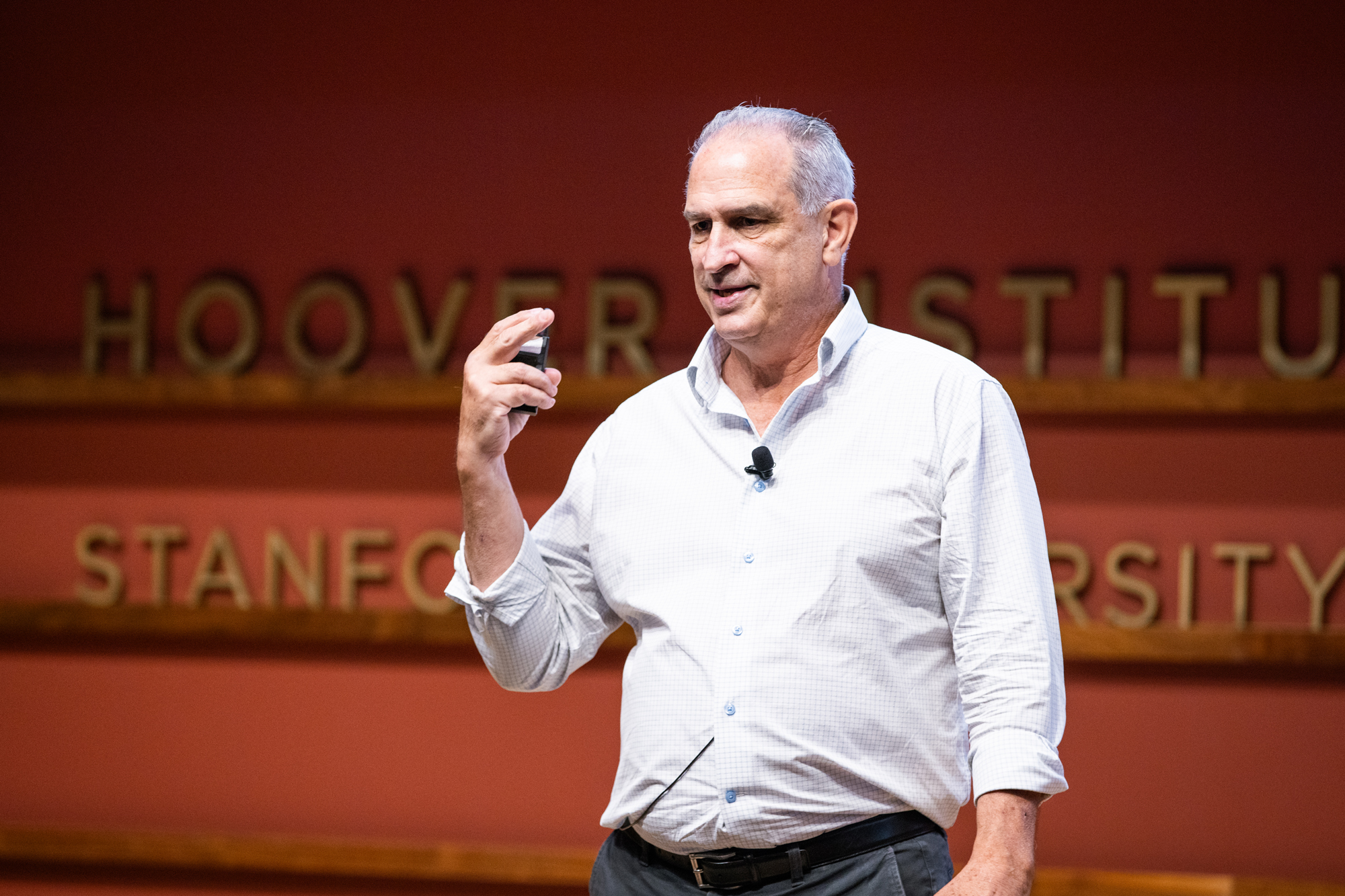
If you want to know why the US had a GDP per capita of $89,000 this year, but a place like Liberia had only $662 GDP per capita, a lot of the explanation (other than recent war, colonization, etc.) is innovation, says Senior Fellow Stephen Haber. But successful innovation has a lengthy list of prerequisites. There must be intellectual property rights, creditor rights, independent courts, free elections, and so on. And the innovators themselves need to spot a demand for something that doesn’t yet exist and then combine a myriad of inputs—capital, engineering, marketing, etc. to make a new commercial product.
Niall Ferguson on Trump in the Historic Context
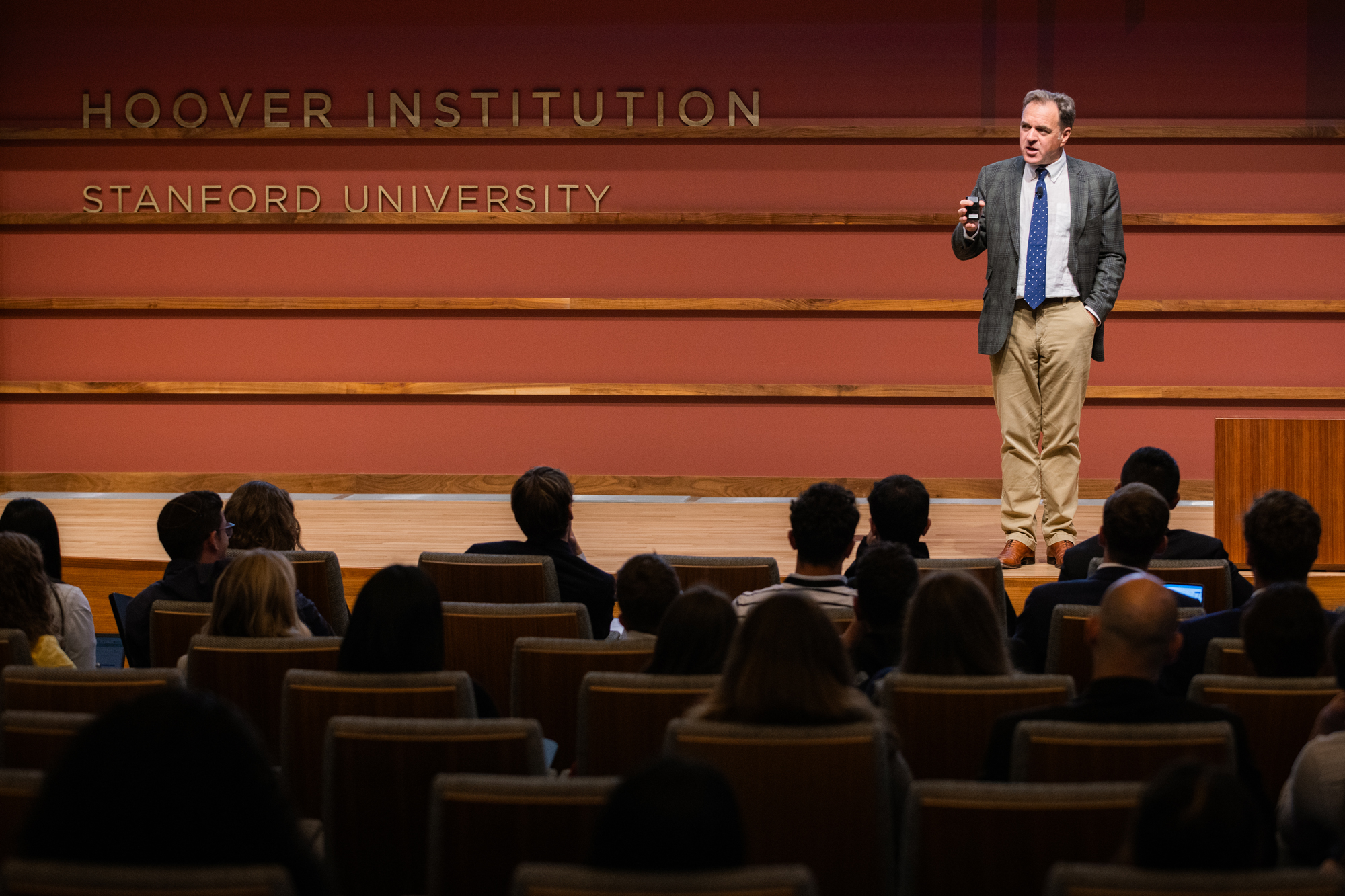
Assessing the second Trump presidency within the context of recent US history, Senior Fellow Sir Niall Ferguson argued that the students present should think back to Nixon. Confronting an ever-more-powerful China, with America’s federal debt servicing costs now eclipsing expenditure on national defense, Ferguson said many of President Trump’s early trade and foreign policy choices mirror those of Nixon. Nixon imposed a 10 percent tariff on all imports and exited the Bretton Woods system in 1971. He then normalized relations with mainland China, angering allies in Asia. With his many waves of tariffs on major trading partners and an entreaty to Russia, Ferguson argues Trump is attempting a similar maneuver, in part to “pull” Russia out of its growing relationship with China.
“The stakes and risks for the US of great power conflict with China are higher than they have ever been in all of American history,” Ferguson told students. And the comparison as a whole between Nixon and Trump isn’t a positive one, as Nixon’s presidency ended in disgrace.
Caroline Hoxby on Three Challenges in Education
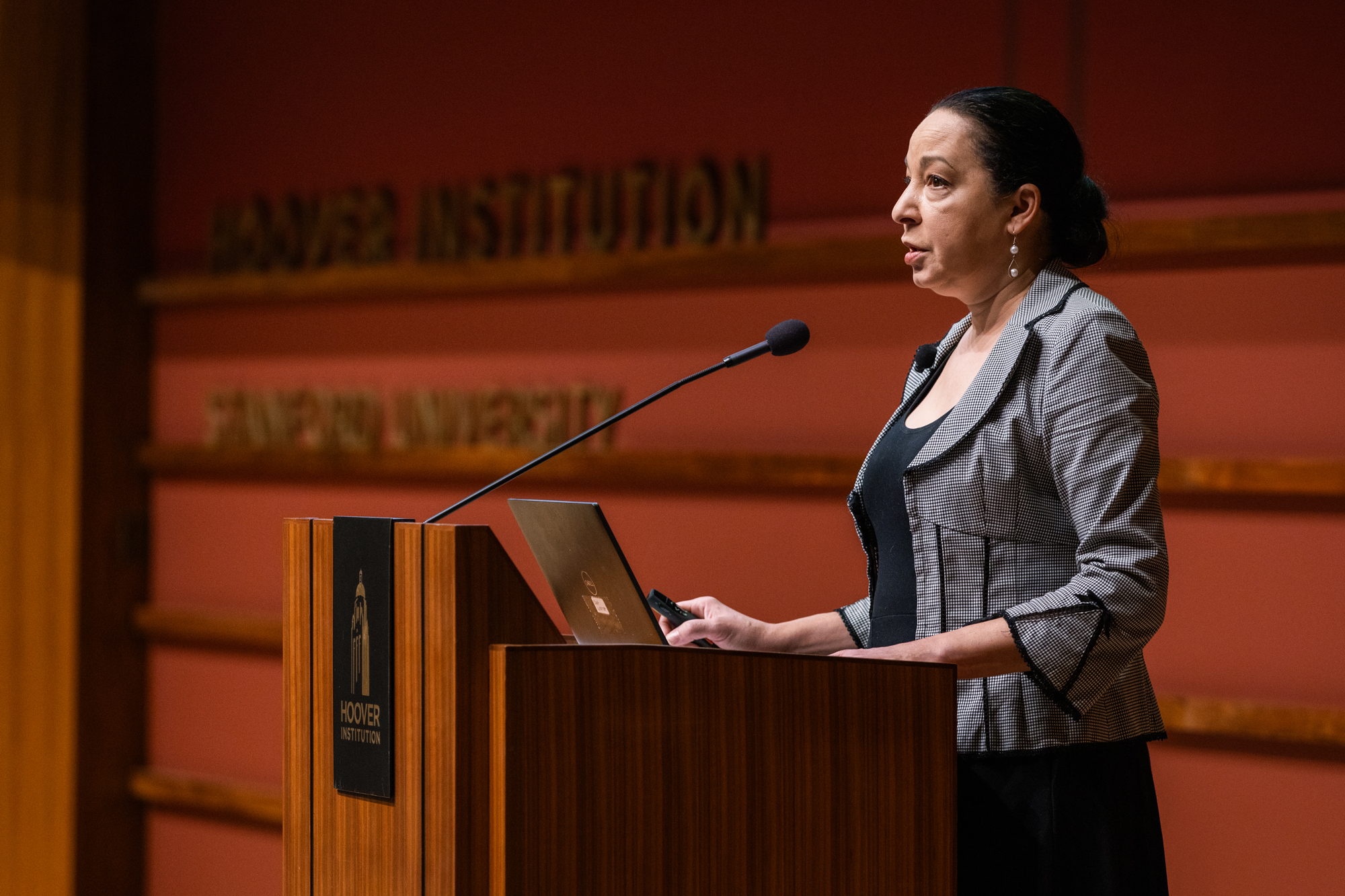
Senior Fellow Caroline M. Hoxby offered participants her insights into three challenges in the education policy space from elementary school to universities and colleges. First, she argued that teacher compensation should be tied to outcomes of students, with teachers receiving a fraction of the future added economic performance of their pupils as merit pay. She has found a teacher who is one standard deviation better than average lifts their pupils’ rate of college attendance by 13 percent and their average earnings at age 30 by 9 percent.
Hoxby also provided research that predicts which university students are most at risk of defaulting on their loans. It’s not who the media often says it is—poor students at highly selective, prestigious universities. Finally, she took aim at the post-pandemic policy of some universities moving to a test-optional or no-test admissions policy. She said this disadvantages poorer applicants who do not have the time or resources to develop all the other things schools consider instead of test scores (internships, letters of reference, volunteer work, etc.).
Barry Strauss on Israel and Antisemitism
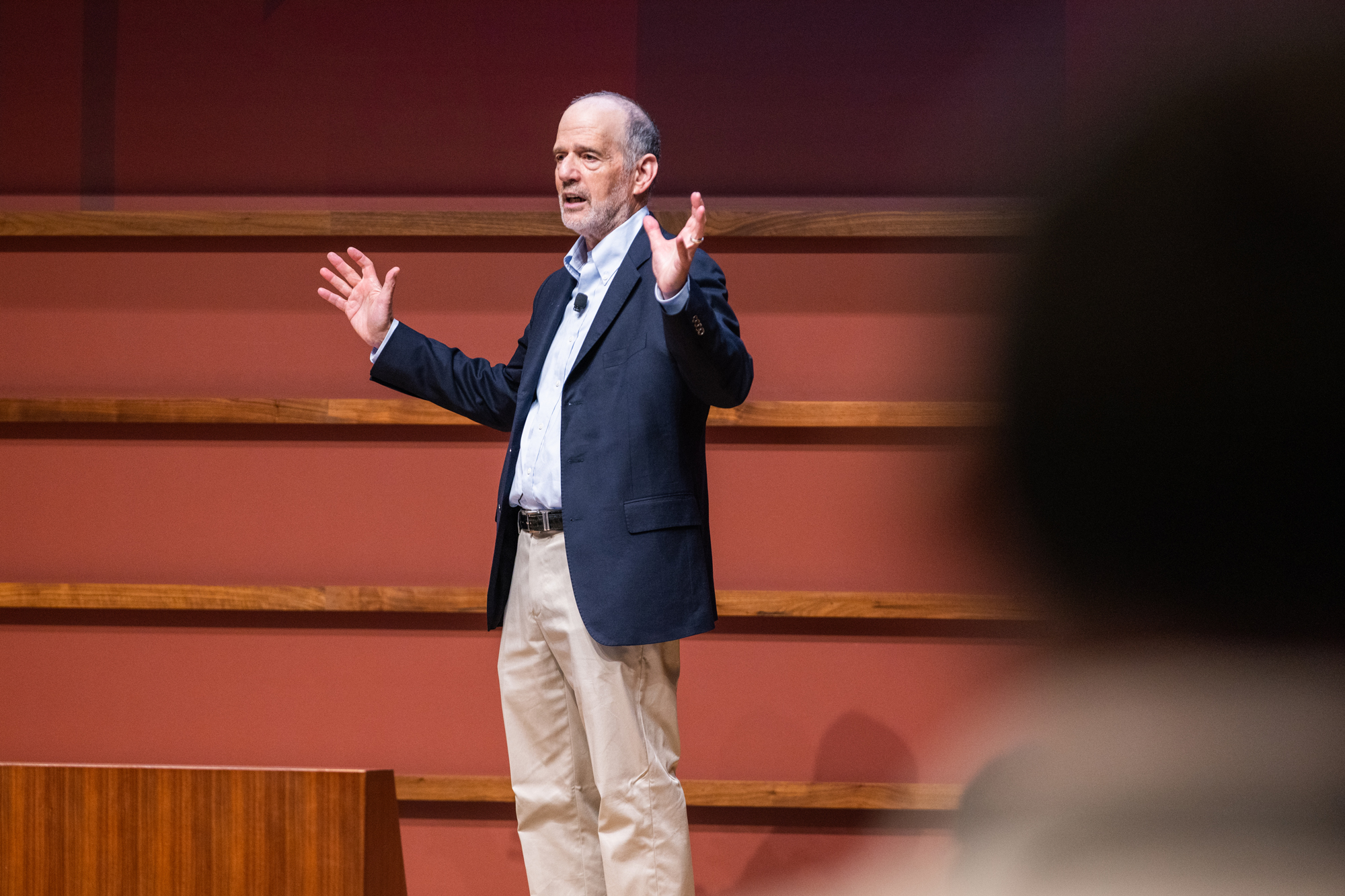
Senior Fellow Barry Strauss situated campus debates about Israel and the war in Gaza within a long history. He addresses three critiques: Israel’s liberal-democratic character, whether anti-Zionism can avoid being characterized as antisemitism, and Jews’ historic claim to the land. Though the presence was small between 800 and 1800 AD, Strauss says there is a host of evidence that points to continuous Jewish settlement of what is now Israel. He said Israel is a flawed liberal democracy, with evidence of various forms of discrimination toward its two-million-strong Arab minority, but it is a democracy nonetheless. He said that antisemitism is rising in the US in part because of a diminishing remembrance of the Holocaust as well as anti-Israel propaganda generated abroad in response to the war in Gaza. Referring to other ethnic conflicts in history, he predicted the current conflict would take a very long time to resolve.
Jendayi Frazer and Linda Thomas-Greenfield on Africa’s Role in Future Multilateralism
Speaking about the relatively bright future of Africa as a youthful, ambitious continent eager to educate and put its youth to work in the jobs of tomorrow, Distinguished Visiting Fellow Jendayi Frazer and guest Linda Thomas-Greenfield, who served as US ambassador to the United Nations in the Biden administration, spoke about the promise and challenges facing that continent as it slowly wrests itself out from underneath colonial burdens and works to settle ongoing civil conflicts in the Sahel, Sudan, and Democratic Republic of the Congo. Frazer spoke about how although primary and secondary education is lacking in many African states, the continent will play an increasingly large role in the global workforce. By 2035, a third of all working-age adults on earth will be African.
Scott Atlas: Health Policy in the New Administration
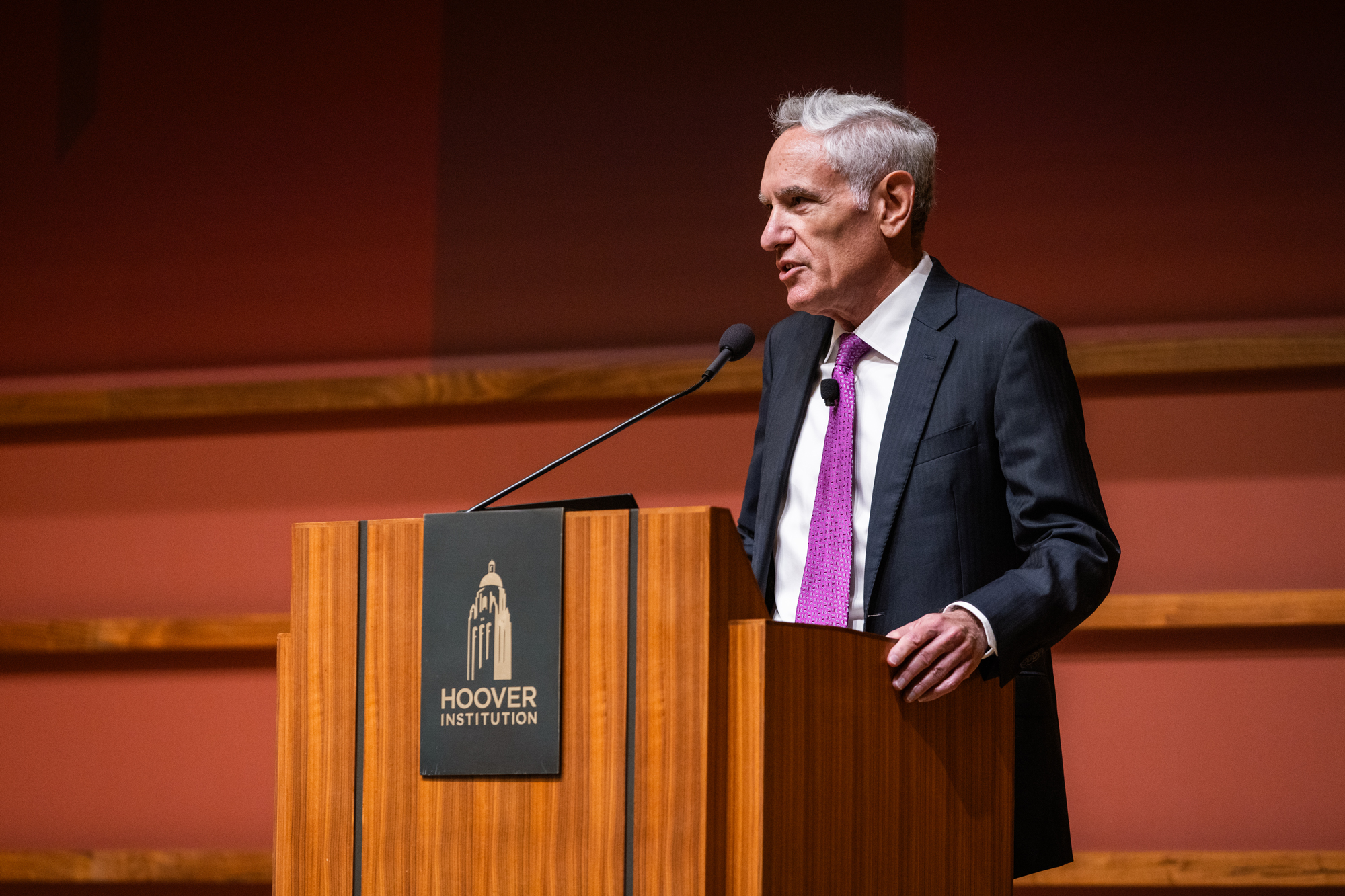
Robert Wesson Senior Fellow Scott W. Atlas spoke about his tenure advising the Trump White House on its response to COVID-19 and addressed the well-documented failures of single-payer healthcare systems and their worse outcomes compared to the US. He pointed out that both Canada and the United Kingdom have significant wait times for doctors, surgical procedures, diagnostics, and drug treatments readily available in the US, and that this results in significant deaths. He showed the data proving better patient outcomes in the US for virtually all serious illnesses. He also demonstrated that a “Medicare-for-all” style single-payer equivalent for the US would be disastrous, generating far worse outcomes and access for everyone, including current seniors on Medicare and the poor.
Brandice Canes-Wrone on Elections and Campaign Spending
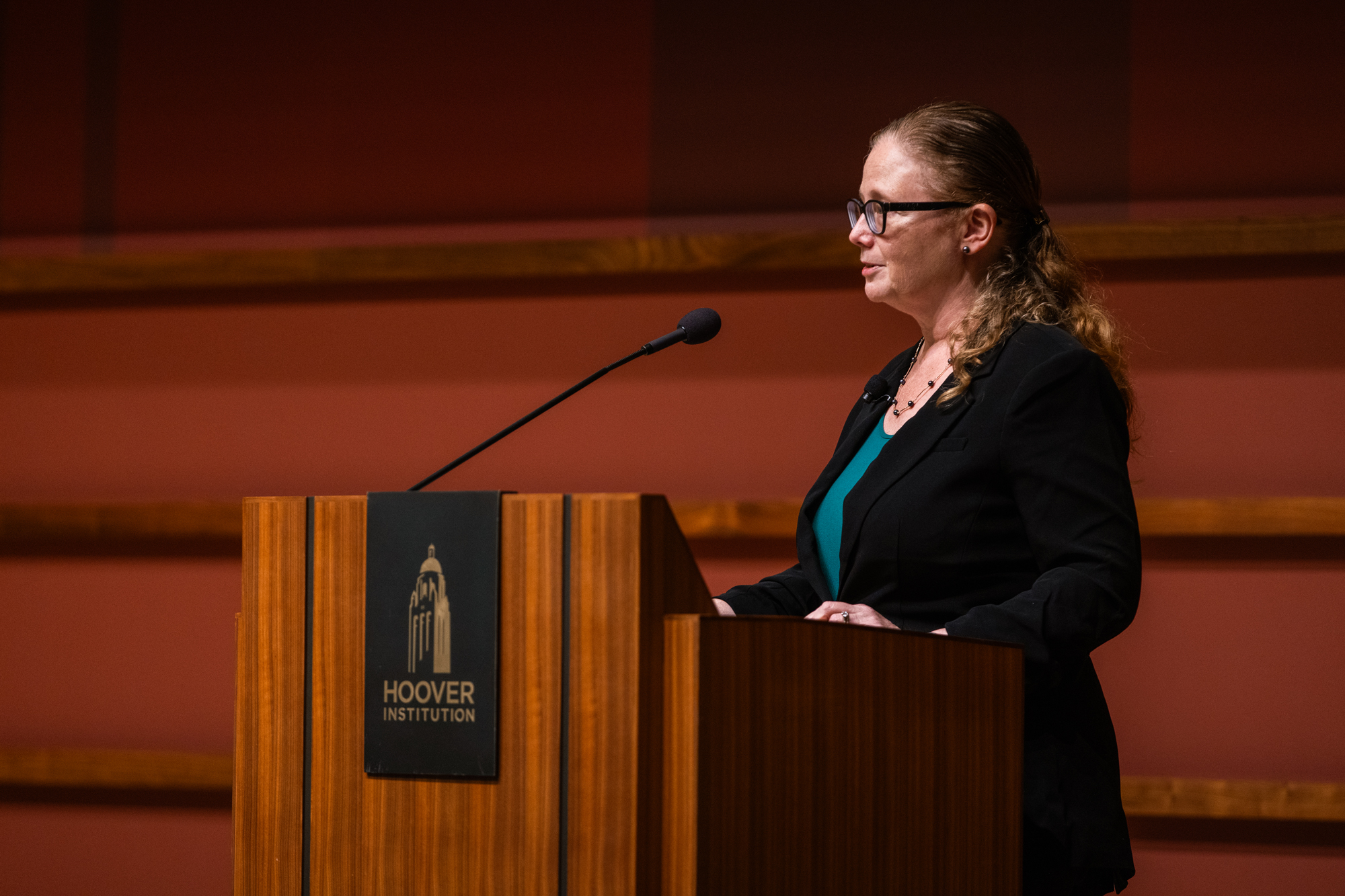
Addressing the role and impact of money in politics, Senior Fellow and Director of Hoover’s Center for Revitalizing American Institutions Brandice Canes-Wrone told HISPBC attendees that money is necessary for campaigning, but outspending your opponent doesn’t always guarantee victory. She pointed to Hilary Clinton outspending Donald Trump two to one in the 2016 presidential race, and how former New York Mayor Mike Bloomberg spent $1 billion on his roughly one hundred-day run for president in 2020, winning only one primary, in tiny American Samoa. She also spoke about her new research that shows that members of Congress are increasingly more attuned and responsive to the opinions of national donors than their own constituents’ opinions.
John Cogan on Federal Entitlements and Spending
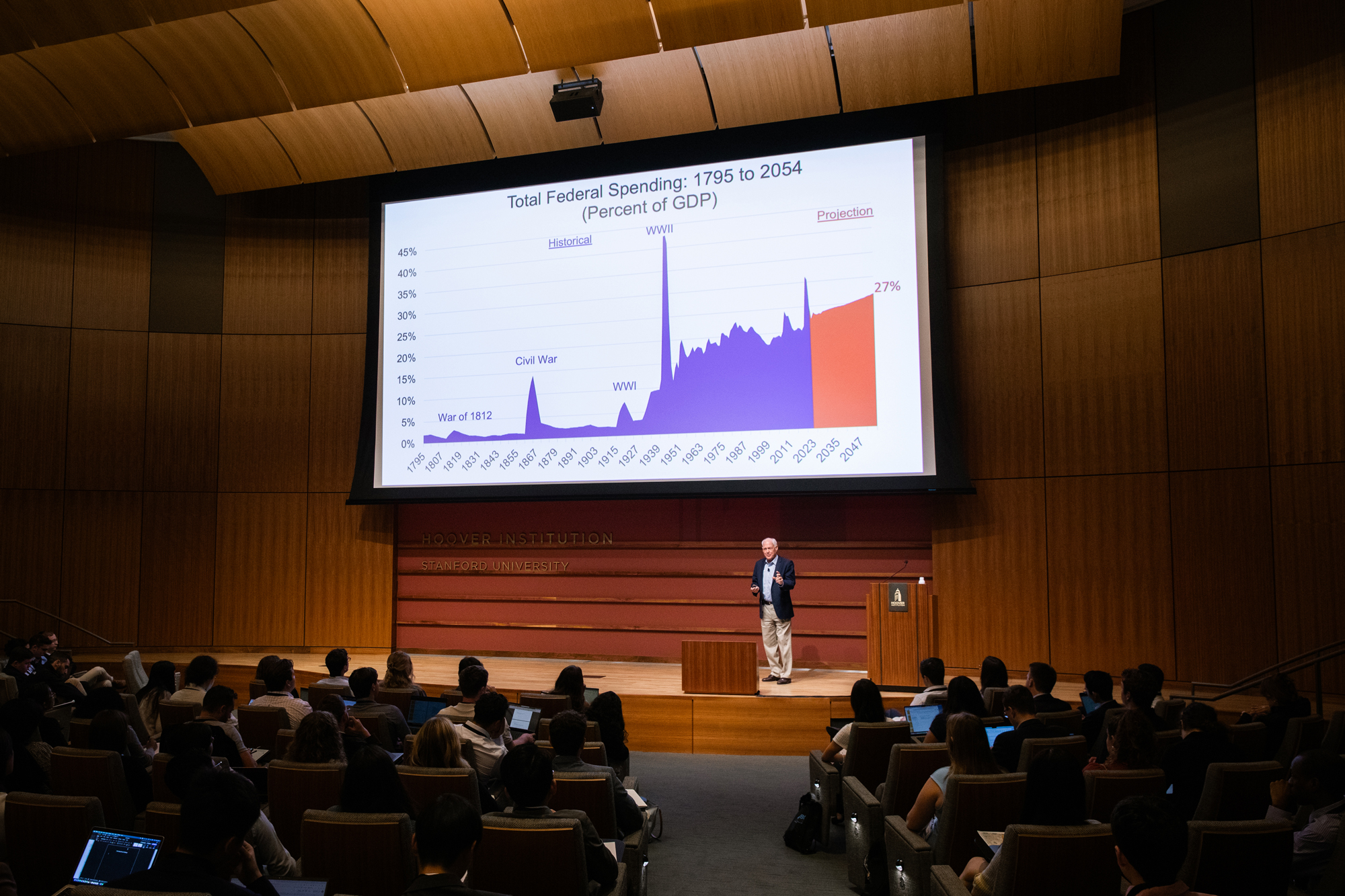
In his presentation, Leonard and Shirley Ely Senior Fellow John F. Cogan shed light on America’s massive public debt, an amount he called “unprecedented in all of our history.” The United States is on track to run a $1.9 trillion deficit in 2025, a larger deficit adjusted for inflation than any period outside of a recession, pandemic, or major war. While federal tax revenues have gone up by 49 percent since 2019, federal expenditures have risen by 58 percent in the same period. To return to balance, Cogan says tax increases and spending cuts outside of entitlements will not be sufficient. He recommends trimming entitlements for people who are otherwise relatively well-off. He estimated that in 2024, $740 billion worth of entitlements went to households in the top 50 percent of the national income distribution.
David Neumark on the Effect of the Minimum Wage
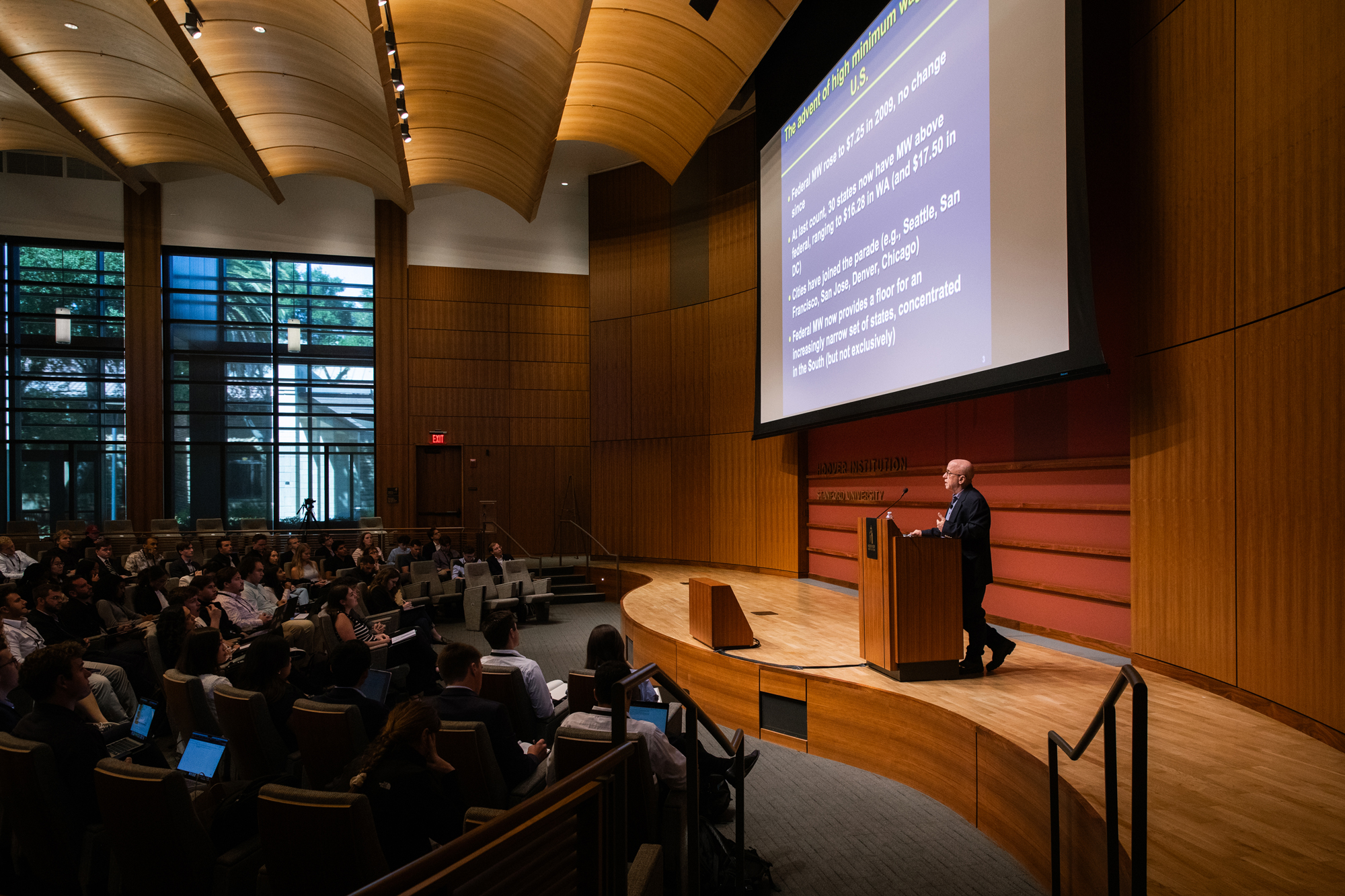
Visiting Fellow David Neumark spoke to HISPBC attendees about how the common understanding of minimum wage laws and their ability to reduce poverty is misunderstood and often wrong. Neumark said the reason minimum wage increases do not do much to reduce poverty is because the link between earning the minimum wage and being in a poor household is extremely tenuous. Another fact that illustrates today’s problem with poverty in the US is that those in the bottom fifth of the income distribution now work fewer hours in a year than they did in the 1960s. He said poorer Americans worked only 17 weeks of the year on average in 2018, down from 37 weeks per year in 1967. He said a better remedy for poverty in the US would be to adjust the tax code and make measures such as the earned income tax credit more generous.
Kiron K. Skinner on the Emerging Trump Doctrine
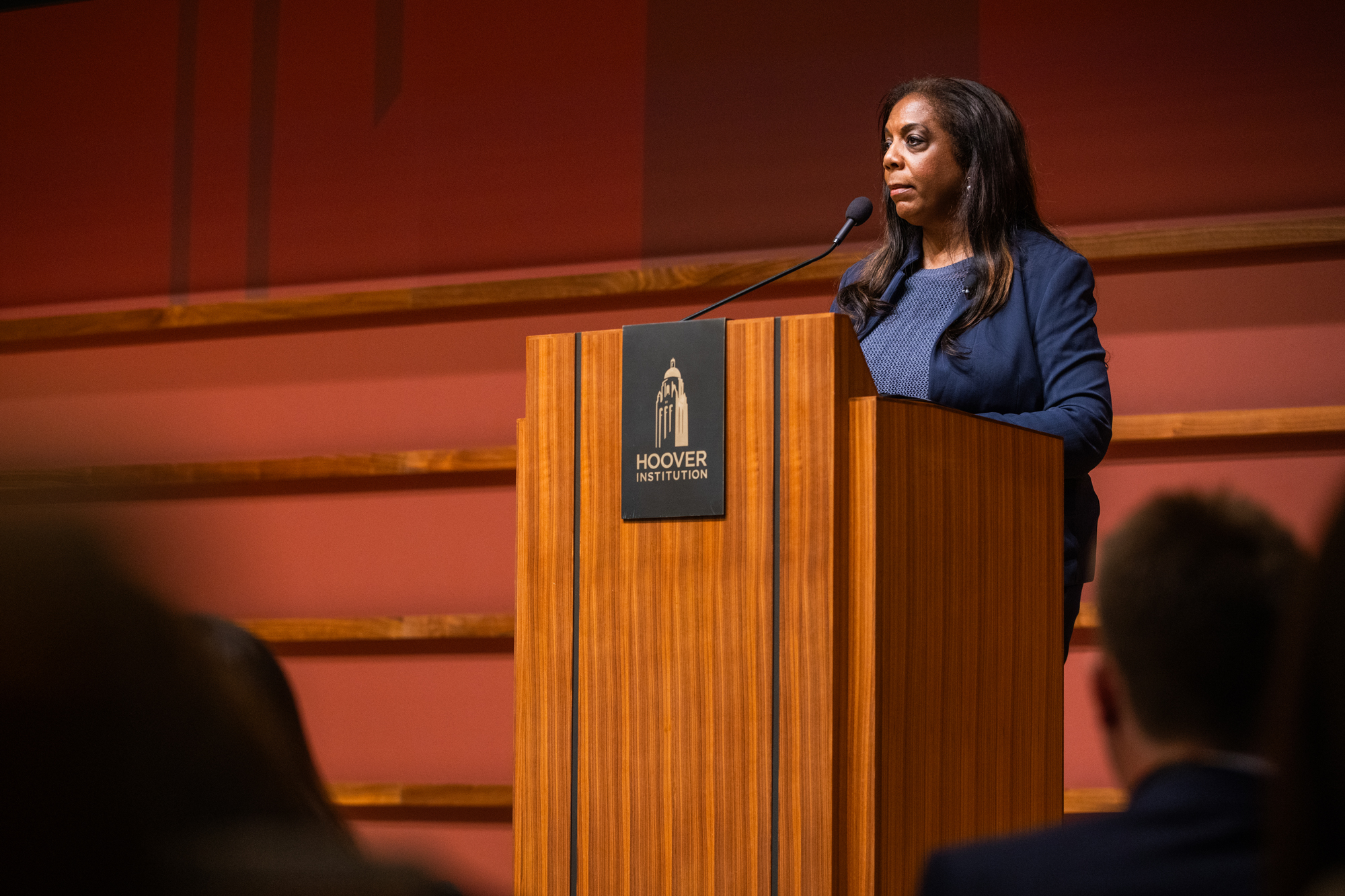
W. Glenn Campbell Research Fellow Kiron K. Skinner told attendees that the Trump administration’s foreign policy does have an overarching aim, to pull the United States out of costly foreign obligations while at the same time asking other nations to do more to advance their own national interests. Skinner argues that Trump is doing this for a variety of reasons: to shed the costs associated with protecting the global rules-based order, to refocus American efforts at countering the military and economic power of China, and to respond to domestic calls from the electorate who are frustrated with the amount of time and money Washington spends concerning itself with the fates of other nations.
Valerie Ramey on Rethinking Keynesian Fiscal Stimulus
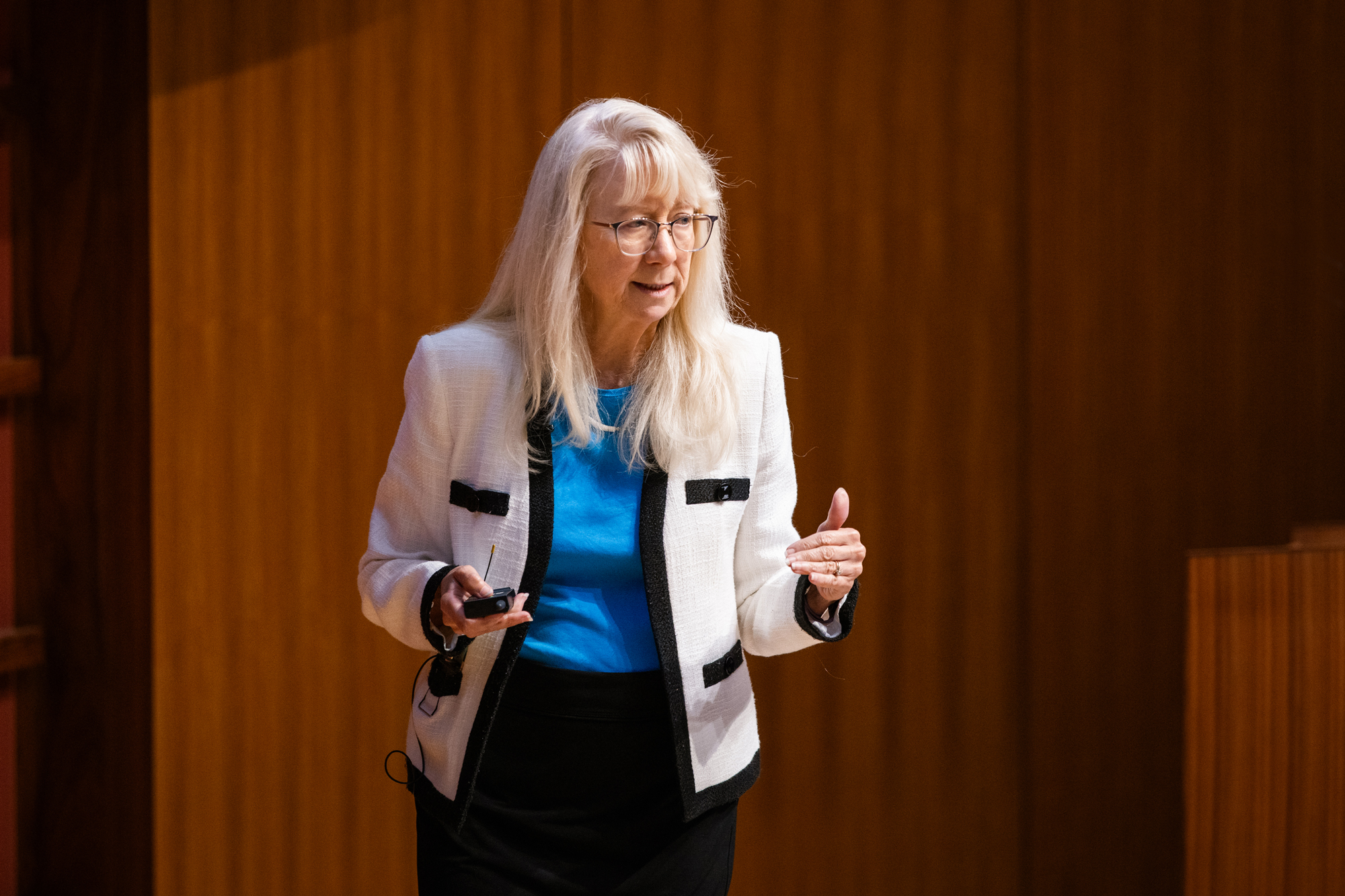
Citing her emerging research on the impact and effect of Keynesian fiscal stimulus on the overall health of the economy, Senior Fellow Valerie Ramey pointed out her recent research that suggests stimulus payments to consumers don’t have the macroeconomic impact on the wider economy that they have long been considered to have. In fact, using data from tax cuts in the US in 2001 and Singapore in 2011, she found lower than expected increases in consumption rates after these stimulus measures were passed.







